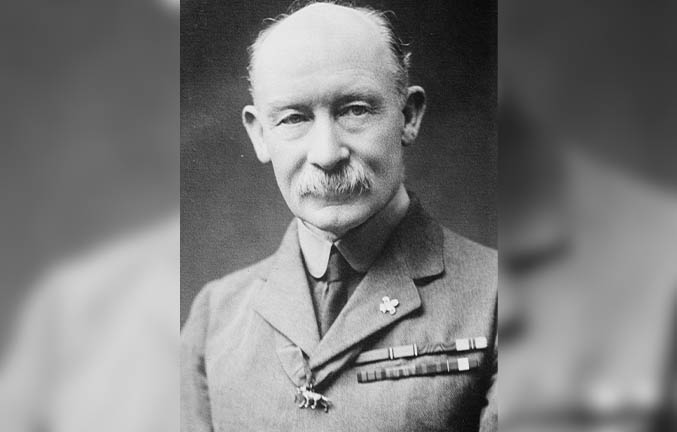E-Newsletter Signup
For special offers, updates and news of new products join our newsletter.
- Also in Camping Tips & Ideas
- Sustainable Camping: Preserving Nature for Future Generations
- The Duke of Edinburgh: The World’s Leading Achievement Award
- Robert Baden-Powell: The Good, the Bad and the Controversy!
- Our Top 10 UK Campsites
- A Brit’s Guide to Camping Abroad
- View all posts in this category >>
GUEST BLOGGER
If you would like to contribute to our blog as a guest and can bring fresh outdoor experiences, please:
Robert Baden-Powell: The Good, the Bad and the Controversy!
Posted in Camping Tips & Ideas on 10th August 2022
Robert Baden-Powell, the founder of the worldwide Scout movement, was a famous British Army officer and national hero before setting up the youth organisation. His heroics during the Second Boer War in 1899 and his other military adventures were described in books that became best-sellers among young people.

© Public Domain
He formed the Scout Association for boys in the early 20th century, while his sister Agnes founded the girls’ equivalent, the Guides. Today, the Scout movement is still going strong and has 31 million members, boys and girls, all over the world.
The name came from his book, Aids to Scouting, a military training manual, after it was used by teachers and youth groups who were organising early camping expeditions.
Early life
Born in Paddington, London, in February 1857, Baden-Powell was raised by his mother from the age of three after the death of his father. A strong woman, she was determined her children would succeed in life. He later attributed his success to his upbringing.
An excellent student, he won a scholarship to Charterhouse. He enjoyed adventure holidays in his youth with his brothers. They would go yachting and canoeing. His knowledge of scouting was honed during these expeditions.
They would camp in the woods near his school, even though this was out of bounds to students, and cook on a campfire. He went on to join the Army in 1876 when he became lieutenant in the 13th Hussars in India. In 1899, during the Siege of Mafeking, he successfully defended the South African town during the Second Boer War.
A national hero, he achieved the honour of being Mentioned in Dispatches for his bravery. He was later posted to Malta for three years to work as an intelligence officer for the Director of Military Intelligence for the Mediterranean. He was given the higher rank of Brevetted Major as a result of his heroism. He was also promoted to Military Secretary and senior Aide-de-Camp.
Disguised as a butterfly collector, he would secretly incorporate military installation plans into his detailed drawings of butterfly wings. His book, Reconnaissance and Scouting, was based on his military travels.
During his time in the military, Baden-Powell befriended Frederick Russell Burnham, an American Scout, who introduced him to tales of the American Old West and woodcraft – later known as Scoutcraft.
Launch of the Scouting movement
Baden-Powell’s popular 1899 book, Aids to Scouting, became a best-seller among boys back home in Britain, who were inspired by his bravery and adventures. As the officer in charge of its scouting section, he had been involved in the Boys’ Brigade – an 1883 Christian organisation for youths.
Along with the interest in his books, this inspired him to launch the Scouts. He rewrote Aids to Scouting to suit a young readership, transforming it from being a military manual. In the summer of 1907, he held a camp on Brownsea Island in Poole Harbour to test his idea for a boys’ Scouting movement. Around 20 boys attended, mostly the sons of his friends.
In 1908, he wrote Scouting for Boys, the first official book on the Scout Movement. It was published in six instalments. Selling around 150 million copies, it was the fourth best-selling book in the 20th century.
Children started setting up their own Scout groups. The first national rally of Scouts was hosted at the London venue, Crystal Palace, in 1909. Baden-Powell met a number of would-be Girl Scouts and as a result, his sister Agnes set up the Girl Guides in 2010 as a similar movement to the Boy Scouts.
Under Baden-Powell’s leadership, the Scouting movement had a positive impact on improvements in youth education. By 1922, there were more than one million Scouts, spread over 32 countries across the globe. The number continued to grow throughout the 20th century.
In 1929, during the World Scout Jamboree, Baden-Powell was presented with an Eccles Caravan as a thank you for his dedication, enabling him to travel around Europe with his wife Olave and their children.
What is the idea behind the Scouts?
The Scouts enabled boys from all walks of life to enjoy the camaraderie of outdoor camping and adventure holidays. While the trips were fun, there was also a serious purpose behind the Scouting Movement.
It was originally for boys aged 11 to 15 years and aimed to teach them good citizenship, chivalrous behaviour and skills in various outdoor activities.
After Baden-Powell’s death in 1941, his legacy continued through the Boy Scouts. The Scouts’ units and troops are divided into individual sub-groups led by Scout Masters. The troops are sponsored at the local level by schools, churches and other community groups.
The jamborees are held all over the world to foster a sense of community. The gatherings are attended by thousands of scouts representing their nations, who go camping together in a spirit of friendship.
In the UK alone, there are currently 464,700 young people participating in the Scouting movement. Girls were first permitted to join the movement in 1976 and UK Scouting became fully mixed in 1991.
Historical controversy
In recent years, controversy has surrounded Baden-Powell’s legacy, after he was targeted by a website calling itself “Topple the Racists”. Accusations were made in June 2020, after Black Lives Matter activists had toppled a statue of the English merchant and slave trader Edward Colston and thrown it in Bristol harbour.
Bournemouth, Christchurch and Poole Council planned to take down Baden-Powell’s statue at Poole harbour amid claims he was a Nazi sympathiser. However, Scouts set up camp at the statue’s base to defend it from protestors.
Later, the council decided to board the statue up, rather than take it down altogether, although the official reason given was that it couldn’t be removed, because the foundations were deeper than anticipated.
In 1939, Baden-Powell had written how he was reading Adolf Hitler’s autobiographical manifesto, Mein Kampf. He remarked it contained good ideas on education”. In addition, the Scouts’ uniform was compared to the clothes worn by the Hitler Youth.
However, historians have pointed out Baden-Powell’s first Scout camp was organised in 1907, when Hitler was only 18, so the uniform was designed long before he rose to political prominence in 1930s Nazi Germany.
In 2010, it was claimed Baden-Powell was once invited to meet Hitler himself. Baden-Powell’s biographer, Tim Jeal, said the 1939 diary entry had been misinterpreted – the comments related solely to education and not to any other aspects of Hitler’s beliefs.
Learn, adapt and improve
In response to the controversy, current Chief Scout Bear Grylls said the Scouts acknowledged Baden-Powell’s “failings”, but also recognised he was a part of their history. He suggested people should realise that the actions and views in Scouting’s past didn’t always match today’s values. “We must learn, adapt, and improve,” Grylls said.
While Baden-Powell took the first step in creating Scouting, the journey was continuing without him. Grylls concluded he hoped Scouting statues would remain in place to remind everyone of the “huge positive influence” the organisation was having on many young people around the world.
The 25th World Scout Jamboree is planned for Korea in 2023. More than 40,000 Scouts from all over the world are expected to attend.
The recent Scout Scarf Day on 1st August encouraged Scouts past and present to wear their scarf in public to mark the “spirit of Scouting”. The scarf today is recognised as a symbol of the members’ ethos to leave the world a better place than when they found it.



